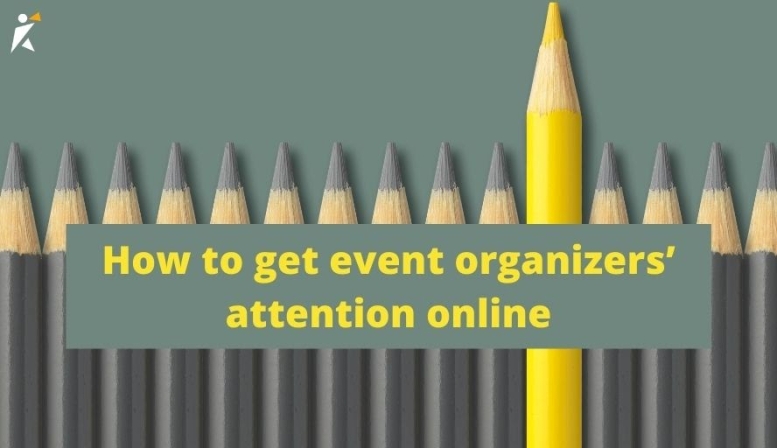How to get event organizers’ attention online

Remember the days when you attended events and met their organizers? You would naturally and confidently pitch your talk to them, immediately make a good impression, and leave your business card to be contacted for future opportunities. Months, perhaps even days, later you’d find an invitation to speak at an event in your inbox. Flight, hotel, stage, and applause. Was that a dream? Might as well have been, because reality these days looks very different.
It’s getting increasingly difficult to make your personality shine through in the online world we now inhabit. But there are a few things you can do to distinguish yourself from the myriad speakers found online in order to get the attention of the right event organizers.
Most experienced speakers will have already done some of these things. Even so, keeping your profiles up to date and having an active online presence requires continuous work, dedication, and creativity. For those who already feel at home online, I have a few tips on how to keep your followers engaged and catch event organizers’ attention.
For those who are still going through business cards collected over the years and wondering how to get back in touch, I have a better solution than sending your contacts a Christmas card to remind them you still exist. Roll up your sleeves and start typing. It’s time for you to get to work to become visible.
In this article, I will take you through some of the soul-searching that you need to do to understand what makes you unique, before getting to the more practical aspects of creating a strong online presence.
Define your profile

First things first, in order to “sell” a product, you need to know it very well. In this case, the product is you, which might sound easy enough. After all, you know you. However, when it comes to knowing your strengths and defining what makes you unique, it gets a little more complicated. You may well find it quite challenging to pinpoint what it is about you as a speaker and your profile that will make organizers want to add you to their line-up.
1. Be clear, be specific
Organizers go out of their way to create events that stand out. They stay up to date with the developments in their industry and constantly take the pulse to choose relevant topics. They usually define their niche and have very clear ideas about what topics are relevant in that niche. They will be looking for speakers to match the criteria they have set out.
As a speaker, you might match some events and topics and not others. This is a sign that you’re not a jack of all trades but have specialized in a field you’re passionate about. How do you use this to your advantage? Refine your bio and talk description to reflect your line of expertise. Clarity is essential when you have to sum up what you’re about. You usually have the attention of the reader for no more than 10 seconds before they start thinking about moving on to reading the next profile. Instead of getting into too much detail, pick some keywords that you think will resonate with the people you want to reach. If you are very specific about what you do, and communicate that well, the right event organizers will come to you. If you often get contacted by event organizers who don’t seem like a good match, go back and see what you need to change in your bio and on your profile to get better results.
2. Stay relevant
Most speakers use their professional experience in a specific industry and continuously do their research to stay relevant. Whether reading journals and magazines, watching other talks, joining forums, looking at the practices of companies in your industry, you need to keep up.
One other way to take the pulse of the industry and understand the event organizer’s requirements is to check out their program. These programs are often thought through in great detail and become a valuable resource for speakers to learn from. Organizers usually have attendee databases that allow them to build customer personas, and build the speaker line up according to this information. A look at what the program includes will give you an idea of the audience. If you plan on applying for a specific event, make sure you look at who is already lined up to speak, and think about what you can bring to the table.
3. Attend events you like
If you like certain events and you think you would be a great fit for them but didn’t make the cut this time around, don’t sweat it. Attend the event and see what it is that other speakers present. You will learn from their content and also have a chance to network with some of your peers. Don’t underestimate networking online. It might not be as fun as networking in person, but the virtual world facilitates communication and exchange just as in the real world, and it’s easier to meet people from all walks of life and all parts of the world.
4. Gather testimonials
If you’ve given successful presentations and got great feedback, make sure you document this. Most event organizers gather feedback from participants and will usually share them with the speakers. If they don’t, send a survey to all attendees if you have their contact details to ask what they thought of your talk. These testimonials are valuable for you, and you can use them to give other event organizers an understanding of why they should book you.
Just make sure you ask people for permission to make their comments public on your online profiles etc.
5. Look at other speakers’ profiles
Some speakers are much sought after. If you want to know what they’re doing right, check out their online profiles. Start with their website, their social media, and try to find where else they have profiles online. It’s a good way to find out where else you could create a speaker profile to increase your visibility. What do their profiles look like, what stands out in their bio, what routes did these speakers take to get where they are? This will inspire you to try other things and will help you map out a route for yourself.
Online platforms & other practicalities

Once you’ve done the soul-searching, gathered testimonials, and know what you want to tell the world, it’s time to start exploring virtual territories. This can quickly get overwhelming as there are so many social media platforms where you can create a profile.
I will walk you through some of the most important ones to help you make a well-defined plan for creating an online presence.
1. Build a website
Your website should host your most complete profile. It’s where you can fit in all the information other platforms don’t allow you to. Setting up one-pagers is easy and a good start, but if you want to stand out, it will take more than just having your resume in a website form.
Use the website to display your skills and expertise, but also think about other content you will want to share there. Think carefully about the structure of your website and the types of content you will have on there. For example, a good way to show your interest in a topic is to regularly produce written content. Your website could include a blog where you regularly write and comment on the hot topics in your field. This shows you’re up to speed, and helps project you a relevant voice in the industry.
Expertise and skills don’t always make a good speaker, so most often event organizers will want to see past talks before booking you. Make it easier for them by uploading snippets of your talks to the website.
2. Social Media
Love it or loathe it, you have to do it. Social media cannot be ignored in this day and age, and a good, active social media presence can mean the difference between your career taking off or stalling. Each social media platform requires a different type of content. Here are some ideas about what you can use each platform for:
Facebook & Instagram
These two are very much image-focused. This might seem daunting for a person whose entire career is built on speaking and the written word. Don’t worry, there are ways for people like you to create visually arresting profiles and have a strong, inspirational message at the same time.
Some very successful speakers have managed to master Instagram and Facebook. Lewis Howes (@lewishowes), for example, is a New York Times best-selling author that also runs a podcast interviewing some of the most successful business people around the world. He manages to strike a good balance between motivational quotes, educational insights, and funny, relatable memes.
Looking at what people like Lewis do will help you brainstorm ideas. But don’t follow the same recipe too closely. Ultimately, what will make you stand out on social media is YOU.
Clubhouse
I’ve written several articles about how professional speakers can use Clubhouse to advance their careers and the pros and cons of this app for public speakers. It’s the social media app that plays to your strength — public speaking. Give some thought to creating this profile because I have a hunch it might become the go-to app for event organizers looking for speakers.
Facebook, Instagram, and Clubhouse might be where you make yourself visible to wide audiences, but LinkedIn is where you connect to people in the industry. Event organizers and other speakers are all usually very active on LinkedIn, and you can get in touch with them easily. If you’ve got a list of events you dream to speak at, you’re sure to find their organizers on LinkedIn.
3. Become a YouTuber
Having your own YouTube channel can take you far. It’s where your history as a speaker can be seen, and all your brilliant moments on stage are one click away for event organizers. When starting a YouTube channel, create categories according to the topics of your talks. That will give the viewers a clear idea of what your fields of expertise are, and also make it easier for them to go straight to what interests them.
4. Use speaker platforms or agents
Event organizers love speaker platforms because they make their life much easier. This is why you want to get on them now.
The reason why they are great for the organizers is also the reason why they might be dreaded by speakers: they offer a wide choice. In the multitude of speakers that platforms host, standing out can be a challenge. Most often, event organizers get option paralysis. We’ve written an entire eBook here at SpeakerHub on how to make your profile more appealing, and what organizers look for when coming to our platforms. Give it a read to learn some tricks on how to catch their eye.
5. Manage your contacts
Making contacts is great, but managing them well will be even more beneficial, albeit hard work. Every speaker should aim to have a substantial network that they tap into when looking for new speaking opportunities. People you’ve met at conferences, people who you follow and who follow you on social media, people you’ve connected with on LinkedIn, people you’ve worked with, also members of your audiences. All are valuable connections if you know how to use them.
Networking is as much about staying in touch with people as it is about meeting them. And the former is way more difficult to do than the latter. It requires discipline and organization and maybe even some tools, such as an email marketing tool.
Conclusion
Going through these steps will increase your chances of being noticed and will ultimately make you a better speaker, one that understands their worth and how to make a valuable contribution.
You might already be doing most of these things, but you can’t afford to become complacent. Online trends change so quickly that staying relevant requires constant effort and creativity.
See you at the next conference!







